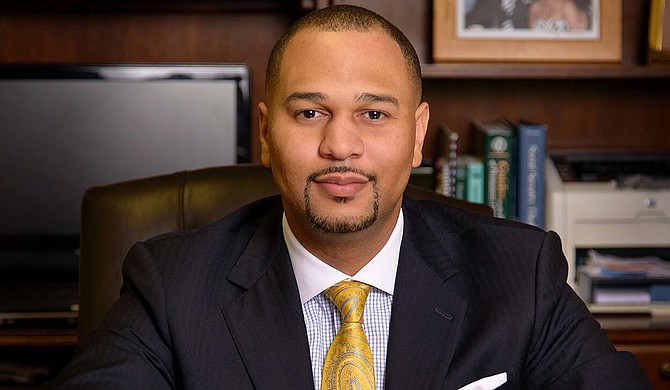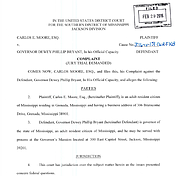A black Mississippi lawyer suing Gov. Phil Bryant for flying the state flag could be successful if he can prove that the state's original intent for putting the Confederate battle emblem on the flag's canton was racist and discriminatory back in 1894. But it will be a difficult, uphill battle, legal experts say.
Carlos Moore's lawsuit says Mississippi's flag is unconstitutional and causes racial violence. Moore, a lawyer based in Grenada, filed the suit Monday, arguing that flying the state flag on state and public property is tantamount to hateful government speech against himself and other African American residents of Mississippi.
"We are happy to give it (the lawsuit option) a try; we think it's worth the fight," Moore told the Jackson Free Press Monday.
Moore believes that his constitutional rights have been violated—along with all African American citizens of the state—because the current state flag contains a Confederate emblem "with a racial discriminatory purpose to subjugate African-Americans to second-class status and promote the notion of white supremacy."
The lawsuit was filed in the Southern Mississippi U.S. District Court, and Moore said that he used some of the same language from the Obergefell v. Hodges case, which the U.S. Supreme Court solidified last June to legalize same-sex marriage nationally. Moore's lawsuit claims that the Mississippi state flag, with the Confederate emblem in its canton, violates the Equal Protection Clause of the 14th Amendment of the U.S. Constitution.
"If (Obergefell v. Hodges) applies to same-sex couples, and they've got the right to be respected, surely African Americans have the right to be respected too," Moore said.
In a statement to the Associated Press, Gov. Bryant's communications director, Clay Chandler, responded to the lawsuit: "This is a frivolous attempt to use the federal court system to usurp the will of the people. The governor hopes Attorney General Jim Hood will seek attorneys' fees to reimburse taxpayers the cost of defending against this needless drain on state resources."
Hoping that one of the 12 bills filed this session to change the state flag would go through last week, Moore had held off on submitting his lawsuit. Last week, however, all flag bills died in committee, and the JFP reported that Gov. Bryant had declared April "Confederate Heritage Month" two weeks earlier during Black History Month—for Moore, that was enough.
"That was the straw that broke the camel's back. I could not wait another day to file this lawsuit," he said Monday.
'Significant, New Ground'
Other states have dealt with lawsuits regarding their state flags, and it's a tough legal road. Moore researched the failed 1990s-era lawsuit in a Georgia county court to change that state flag, in order to avoid the same legal mistakes."The plaintiff, an African American in that case, did not point out specific instances where the state flag was the cause of racial violence or disparate treatment of African Americans," Moore said.
Moore said he mentions the mass killing of nine African Americans in South Carolina as well as instances specifically in Mississippi in his lawsuit, including a man who had photographed himself wrapped in the state flag before bombing a Walmart store in Tupelo that stopped selling Confederate merchandise last November. Moore points out that even neighbor states like Alabama have taken the Confederate flag down from their Capitol following the South Carolina mass shooting last year.
Matt Steffey, a constitutional law professor at Mississippi College, said the lawsuit would need to break significant new ground for it to work because constitutional free speech (for individuals) does not apply to government speech—which includes the state flag. Steffey said Moore would have to prove that the flag has caused people to commit hate crimes in Mississippi on account of their race as well as show that it's likely to happen again.
"You have to show that Mississippi flies the flag because it wants to promote racial violence, not because of the fact," Steffey told the Jackson Free Press..
The lawsuit could have a better avenue of success, Steffey said, if Moore can prove that the government's original purpose for choosing the state flag was racist or discriminatory back in 1894 because then the burden of proof would shift to the government—not Moore. Either way, Steffey said the lawsuit would be an "uphill battle," but noted that big cases that lead to change are never easy. "If this were easy to accomplish, it would have been done already," Steffey said.
Not 'Free Speech'
Last summer, the U.S. Supreme Court ruled against the Texas division of the Sons of Confederate Veterans who wanted a state-issued license plate design (which Mississippi offers). The Court ruled that the state was not required to issue special Confederate license plates because they are considered government speech. This decision actually hurts Moore's case, Steffey says, because it made clear that government expression is free from First Amendment free-speech rules.
In the majority opinion in the case, Walker v. Sons of Confederate Veterans, Justice Stephen Breyer wrote, "Government statements do not normally trigger the First Amendment rules designed to protect the marketplace of ideas."
In Texas this meant that the government could bar Confederate symbols; in Mississippi this could mean it can keep them. Justice Breyer's opinion did reiterate, however: "That is not to say that a government's ability to express itself is without restriction. Constitutional and statutory provisions outside of the Free Speech Clause may limit government speech."
Moore is ready and willing to fight and says he expects justice at the end of the day.
"All the other southern states have seen the light—Mississippi can't seem to get it, but we're trying to help them see and understand that that's not acceptable," Moore said. "No civil rights have been advanced in Mississippi without federal intervention, so we expect the federal government to protect us in this instance."
Also see: Jim Hood Says He'll Defend the State In Lawsuit Against State Flag, But Flag Should Change
For more visit jfp.ms/slavery.





Comments
Use the comment form below to begin a discussion about this content.
comments powered by Disqus